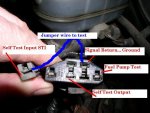Hi Twitch,
I don't know if a vacuum leak would cause all three of those codes or not, but I am thinking ... maybe.
I'll post a reminder of what to look for regarding vacuum leaks in a minute.
You'll probably have two fuses, and two fuel pump relays, one for each pump. You may want to check to make sure that they are both working. Also check your electrical connectors for each of the components listed above regarding your codes.
Checking for vacuum leaks.
Some of the sensors and some of the actuators either read the amount of vacuum, or use vacuum to move controls, therefore it is important to the proper functioning of the engine that your vacuum system is fully intact. Otherwise one may get codes falsely indicating that there is a problem with a controller/actuator, or a sensor when in reality it is caused by a lack of vacuum.
Look at your rubber vacuum hoses (they are about 1/4 - 3/8 inches in diameter, if they are dry rotted or cracked, replace them. IF they slip on/off of their connectors too easily, they may have stretched out a little bit, cut the ends off, and put them back on.
IF you have a vacuum pump, you might pinch off sections, apply vacuum and see if it holds.
You may test vacuum actuators by applying vacuum to them directly and watching to see if that work.
If you can get her started,
You may listen for a leak. Sometimes using a cut off piece of garden hose is a good aid to listen with. Sometimes a cardboard tube (like from gift wrapping paper) is helpful. Just remember that whenever you stick your head inside a running engine compartment, that you are not wearing any loose clothing or jewelry that can get caught.
Another suggestion is to use a spray can of carb cleaner and spray around the bottom of the intake manifold, and the base of the throttle body assembly. IF there is a leak, you should hear a change in your engine.
Keep a fire extinguisher handy, or use water instead of carb cleaner (it works, but not as well.) Be aware that if you use water and the wires get wet and it runs worse... your wires may be bad, and the water is allowing them to arc instead of jump the gap of the spark plug.
Another suggestion is: to take a propane torch, turn it on (but don't light it) and move it over the vacuum hoses and connections. The engine RPM's will increase if there is a leak and the propane gets sucked in.
Don't forget to check the PCV valve, hose and grommet.

